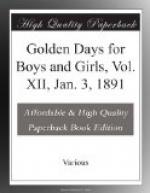Tony sank into one of the chairs, while Morrison elevated his feet upon the desk before him.
“Now, are you ready?” he said, with a laugh. “Well, here goes. I worked in this store two years, under this man Smart—and a precious rascal he was, too—and never knew that my father owned this store and everything in it. Mr. Smart had been a clerk for father in Boston, and the object of the deception was to see if I really had any liking for business. And what do you suppose the result is?”
“I don’t know,” said Tony, feebly.
“I’ll tell you,” continued Morrison. “I was twenty-one years old yesterday, and I am sole proprietor here.”
Tony looked at his companion in a peculiar way; saw how his eyes sparkled and his cheeks flushed with eagerness, and he knew that his heart was light and happy with ambition and hope. But the gulf between them was wider than ever.
“I congratulate you,” he said, huskily. “I wish you everything—”
He stopped and rose to his feet, but Morrison pulled him down into the chair again.
“Don’t go yet,” he pleaded. “I’m not through. Now I want a favor of you. I want you in the store with me. Stop!” he said, imperatively, as Tony attempted to speak. “I know what your objection will be, but it’s no use. There are evening schools here in the village, and you can attend them as much as you wish. You are bright and quick; I’ll risk you. Mind before muscle, any time.”
What could the poor fellow do? Nothing, except to grasp the hand of Morrison and shed tears of gladness, while his lips vainly strove to utter the thankfulness which over-flowed his heart. His wildest dreams were more than realized, and, better than all material advancement, he would not be parted from his friend.
And Morrison never had occasion to regret his offer, for Tony took to the business like a duck to water. A year later, Mr. Morrison, senior, said to Job Loring, who was making some alterations in the rich man’s stable:
“A wonderfully smart boy of yours, Mr. Loring. It doesn’t seem possible that twelve months can work such a change.”
Job ran his great fingers through his shaggy hair, and made answer in a puzzled sort of way:
“It do seem strange, Mr. Morrison—it do, for a fact. I al’ays pitied the little chap, and kep’ tellin’ him he’d never be any good. But there, it shows that size don’t al’ays count, and I wish Aaron could ’a had more brains, even if he didn’t have quite so much muscle.”
The story of Isaac Furbush’s petty pilfering in some way got noised about the village, and it seemed as though the disgrace would ruin his prospects in Ashville, till Tony induced Morrison to give him a job as porter in the store.
Isaac, to whom the bitter lesson had been extremely beneficial, accepted the situation thankfully, and a goodly portion of his superfluous flesh disappeared in his zeal to prove himself worthy of his employer’s confidence.




